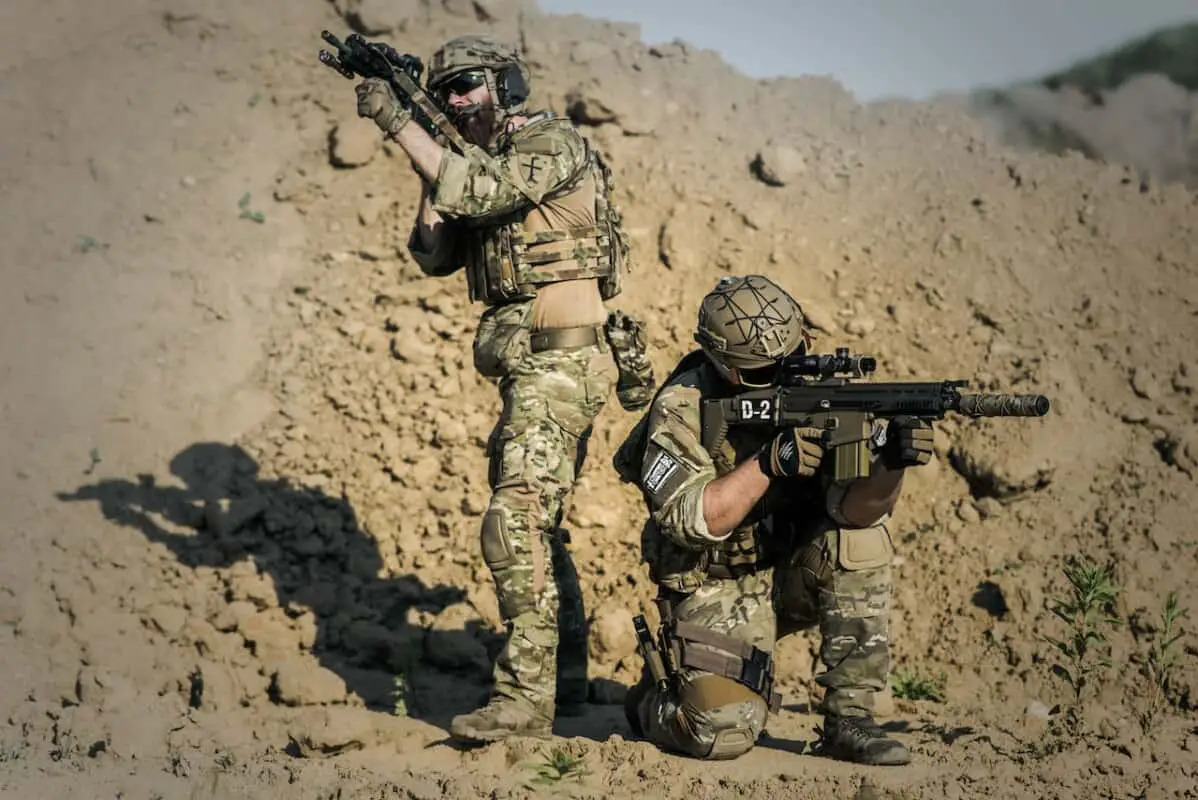
While many people engage in airsoft for fun and entertainment, it has also gained traction as a valuable training tool for improving real-life shooting skills. But can airsoft really help you enhance your marksmanship, tactical abilities, and overall firearm proficiency?
Airsoft can improve real-life shooting skills by reinforcing marksmanship fundamentals, promoting tactical training, and enhancing weapon manipulation. However, it should be used as a supplementary tool alongside traditional live-fire practice to ensure comprehensive skill development.
In this article, we will delve into the benefits and limitations of airsoft training and discuss how it can be an effective supplementary tool for developing your real-life shooting skills.
Basics Of Learning To Shoot
One of the most critical aspects of shooting is mastering the fundamentals of marksmanship. These include proper sight alignment, trigger control, grip, stance, and breath control. While airsoft guns may not have the same recoil, known as blowback or ballistic properties as real firearms, they can still help trainees develop these essential skills.
Airsoft guns closely resemble real firearms in size, weight, and appearance. This similarity allows shooters to practice handling and operating their weapons consistently.
Moreover, the low cost of airsoft ammunition encourages trainees to practice more frequently, reinforcing muscle memory and the principles of marksmanship.
Tactical Training
Airsoft can be an excellent platform for tactical training, especially for those who participate in team-based airsoft games. These games often involve realistic scenarios and objectives that require players to communicate, strategize, and cooperate effectively.
By engaging in these activities, individuals can learn essential tactical concepts such as cover and concealment, movement, teamwork, and situational awareness.
In addition, airsoft provides a safe environment for practicing tactics that may be too dangerous to execute with live firearms, such as room clearing and close-quarters combat. This type of training can help shooters develop their decision-making skills and adaptability under stress.
Weapon Manipulation and Malfunction Drills
Airsoft guns offer a safe and cost-effective way to practice weapon manipulation, such as reloading, transitioning between targets, and maintaining proper weapon control. These skills are crucial for real-life shooting scenarios, where speed and efficiency can mean the difference between success and failure.
Moreover, airsoft guns can simulate weapon malfunctions, such as double feeds, stovepipes, and failure to eject.
By practicing malfunction drills with airsoft guns, shooters can develop the necessary skills to clear these issues quickly and efficiently during a real-life shooting scenario.
Stress Release
Airsoft games can be physically intense and adrenaline-pumping, providing a realistic and immersive environment that helps shooters develop stress management skills.
The ability to remain calm and focused under stress is essential for effective shooting, particularly in high-stakes situations like law enforcement or military operations.
Shooters can learn to control their breathing, maintain proper focus, and make quick, accurate decisions under pressure by participating in airsoft events. This stress inoculation training can translate into improved performance in real-life shooting situations.
Safety Practices
Airsoft training can reinforce proper firearm safety practices. Although airsoft guns are not lethal, treating them with the same respect and caution as real firearms can help instill safe habits in shooters.
This includes keeping your finger off the trigger until ready to fire, always pointing the muzzle in a safe direction, and being aware of your target and what’s beyond it.
Limitations of Airsoft Training
While airsoft training offers numerous benefits for improving real-life shooting skills, it’s essential to recognize its limitations.
Airsoft guns lack the recoil and noise of real firearms, which can affect a shooter’s ability to manage these factors in real-life situations.
Moreover, the ballistics of airsoft BBs differ significantly from real ammunition, limiting the effectiveness of airsoft training for long-range shooting or precision marksmanship.
Complementary Training Tool
Despite these limitations, airsoft can serve as an effective supplementary training tool when used in conjunction with traditional live-fire practice.
By incorporating both airsoft and live-fire exercises into a training regimen, shooters can benefit from the unique advantages each method offers.
For example, they can practice fundamentals, tactics, and weapon manipulation with airsoft guns, then refine their recoil management and ballistics understanding during live-fire exercises.
Customized Scenarios and Skill Development
Airsoft training can be tailored to address specific skill gaps or weaknesses in a shooter’s performance. By designing customized scenarios, shooters can focus on developing particular skills, such as target acquisition, communication, or movement.
This targeted training can help shooters progress more quickly and achieve greater proficiency in real-life shooting situations.
Accessibility and Affordability
Airsoft training offers a more accessible and affordable alternative to live-fire ranges, particularly for those who live in urban areas or have limited access to shooting facilities.
The lower cost of airsoft guns and ammunition, as well as the availability of indoor and outdoor airsoft fields, make it easier for individuals to practice and improve their shooting skills regularly.
Building a Training Community
Participating in airsoft events and training sessions can help shooters build a community of like-minded individuals who share a passion for shooting sports and self-improvement.
This camaraderie can foster a supportive environment for learning, sharing tips and techniques, and receiving constructive feedback from peers. The sense of belonging and friendly competition can help motivate shooters to continue honing their skills and strive for excellence.
Conclusion
While airsoft training has its limitations, it can serve as a valuable supplementary tool for improving real-life shooting skills.
By focusing on the fundamentals of marksmanship, tactical training, weapon manipulation, stress inoculation, and safety practices, airsoft can help shooters develop a solid foundation for success in real-life shooting situations.
To maximize the benefits of airsoft training, it’s essential to combine it with traditional live-fire practice and recognize its limitations. By doing so, shooters can leverage the unique advantages of both methods to enhance their overall firearm proficiency, safety, and tactical abilities.

